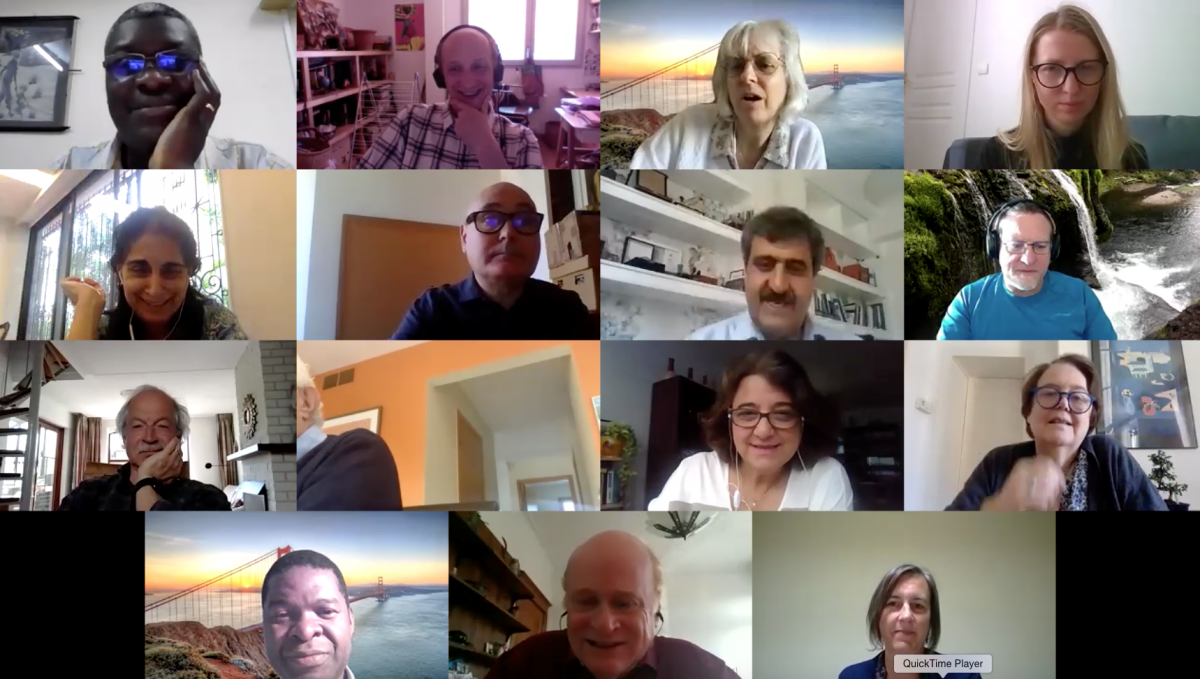Virtual Council meetings & prospects for 2020-21Zoom, 14, 15, 17 April and 4 May 2020
The spring 2020 IUSSP Council meeting took place through four 90-minute Zoom meetings on 14, 15, 17 April and 4 May. The Council meets at least once every year, usually in person, to review the previous year's activities, formally approve IUSSP accounts, review the planning budget for the current year and discuss new activities and initiatives. Council members discussed plans for new panels and activities including a new webinar series, preparations for the 2021 International Population Conference (IPC), changes to the guidelines for host countries interested in organizing future IPCs, and the development of a new Junior Demographer award and an anti-harassment policy for IUSSP events. At the top of the agenda for this year's meeting was a strategic assessment of the impact of COVID-19 on IUSSP activities, including the next International Population Conference planned for 5-10 December 2021.

The Council is especially concerned about the short and long-term impacts of COVID-19 on IUSSP activities and prospects for funding. Currently, funding from donors is ample due to several multi-year donor-funded projects and programmes, while expenditures for travel to meetings in 2020 have fallen. IUSSP Panels had been planning over 20 activities for 2020; they have now cancelled, postponed, or moved these activities to virtual platforms.
The Council earmarked funds to develop a platform for webinars and virtual meetings and seeks to encourage all panels to transform already planned activities into virtual events rather than postponing or cancelling them, whenever possible. While online events do not provide the same potential for exchange and developing networks as in-person meetings, in the current context, they are the only available alternative and have the advantage of being accessible to members and researchers from other disciplines residing across the globe.
Of more significant concern is the impact COVID-19 will have on plans for the International Population Conference. While it is too early to know how the pandemic will unfold and its direct impact on events planned for the end of 2021, COVID-19 and the related economic crisis will surely make fundraising more difficult. The Indian National Organizing Committee (NOC) has already signed a contract with the Hyderabad International Convention Centre, making any venue change difficult for the NOC. The Council has decided to maintain the IPC for Hyderabad in December 2021 and provide additional support to the NOC's fundraising efforts. The IPC Steering Committee is also considering cost-cutting options that might include holding a shorter conference with fewer sessions and participants and providing less or no support for travel awards. If necessary, the Steering Committee may also entertain the option of holding a hybrid (onsite and virtual) event.
The Council proposed that COVID-19 be added as a cross-cutting theme for IPC2021. By December 2021, researchers should have results to share on the demographic impacts of COVID-19 across a range of high-interest issues to the public and policymakers. To give scholars more time to consolidate their research, the deadline to submit papers to the IPC2021 has been moved forward to 15 February 2021.
Given the considerable costs of hosting the International Population Conference and the growing difficulty host country organizers face in raising funds, the Council approved revised guidelines for organizing future IPCs. This document aims to assist members who are considering making a bid to host the 2025 conference. The new document makes optional some of the more costly requirements, such as simultaneous interpretation and funding for travel grants, and offers other cost and revenue sharing options to make hosting the conference less onerous.
The COVID-19 pandemic has also served to highlight the value of experts for policy and programmes and the critical need for good data to support their efforts. Population specialists are well placed to contribute to these activities. Many demographers are already involved in assisting governments in estimating the pandemic's trajectory and in providing essential information for planning and interventions. IUSSP members have expertise on many relevant issues, including innovative data collection approaches, estimating the impact of policies and measures to curb the spread of the disease on the number of lives saved, assessing levels and impacts of gender violence, depression and suicides during confinement, changes in internal and international migration streams, and understanding other long-term impacts of the epidemic. The Council has decided to create two new panels that will focus on different aspects of the COVID-19 pandemic. The Council is presently finalizing the panels; more information will be available by the next IUSSP Bulletin.
The Council decided to develop a new Junior Demographer Award that should start at the 2021 IPC. Tentatively, the Council hopes to work closely with the regional population associations to designate one top junior scholar from each continent (Africa, Asia, Europe, Latin America, and North America); the IUSSP would recognize their research achievements in a specially dedicated session at the IPC.
Lastly, the IUSSP is in the process of developing an anti-harassment policy for IUSSP events. In recent years, incidents of harassment at academic conferences have highlighted the need for policies to prevent harassment from occurring and handle incidents when they do. To date, the IUSSP has not had a specific policy. The new policy will include a code of conduct that emphasizes the central value of IUSSP meetings as inclusive and welcoming events for intellectual exchange. The policy will clearly define harassment, include a process for reporting and review of complaints, and, when needed, sanctions.
Much was accomplished at the 2020 Council meeting, despite its being much shorter and carried out virtually. However, we hope that by early 2021, the IUSSP Council will be able to hold its annual meeting in person again. The IUSSP auditor, Mazars, has approved the IUSSP 2019 Annual Management and Financial Report, which members can read here. |
